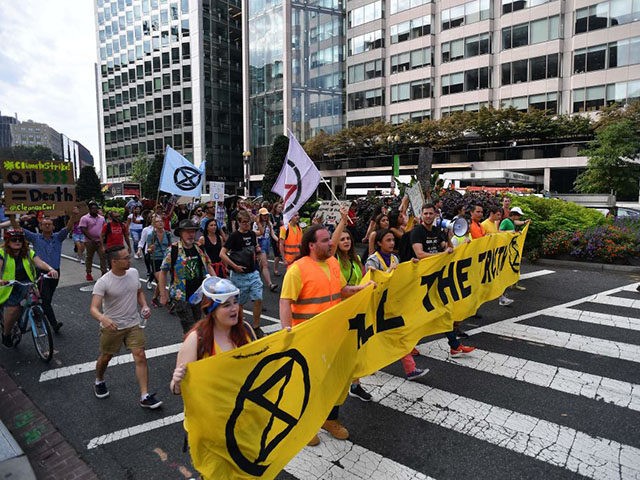China’s state-run Global Times on Monday offered a rare bit of criticism for the climate change movement, which goes to great lengths to avoid criticizing Communist China.
The Global Times prodded climate change partisans to avoid street demonstrations like the one they held in Washington, DC, on Monday.
“Climate activists” staged a “ShutDownDC” protest on Monday, blocking several major intersections and causing enormous traffic jams. This was preceded by “FridaysforFuture” street actions in numerous countries patterned after teenage climate activist Greta Thunberg’s call for schoolchildren to go on “strike” by skipping classes.
The response from the Global Times was a mild rebuke that did not directly reference the D.C. protest or linger on the similarities between these protests and those held in Hong Kong against Beijing’s rule. Blocked intersections and school strikes are tactics employed by the Hong Kong protesters as well.
The Global Times was generally supportive of climate change activists but prodded them to avoid the tactics used by democracy activists, who the Chinese are working very hard to portray as out-of-control rioters:
Millions of climate activists in 156 countries and regions reportedly participated in the Fridays for Future street demonstrations on Friday, demanding the international society to take more actions to deal with global climate change.
However, not engaging in protests doesn’t mean that Chinese people don’t care or support climate protection. On the contrary, according to a 2017 survey issued by the China Center for Climate Change Communication, an institute focusing on climate, 94 percent of respondents supported China’s implementation of the Paris Agreement and 96.8 percent supported the Chinese government to participate in international cooperation on climate change. The ratios are higher than those of almost all other countries.
Such misunderstanding also shows that the logic of Westerners’ mentality is flawed. Is occupying streets the only way for people to express their appeals? Can such demonstrations really solve environmental problems?
When people from the West encounter social problems, they first organize protests, through which they hope the problems could be solved. But the key to whether the problems can be solved and how the problems will be handled lies in how their governments pay attention to and respond to people’s demands. In this respect, the Chinese government is at the forefront of the world.
The Chinese Communist Party’s response to climate action protests against China would be fascinating, and probably very unpleasant for the activists. Fortunately, neither the Chinese Communists nor the activists have anything to worry about, because despite the Chinese being the worst polluters on the planet — with plans to get even worse, not better, over the next few decades — the climate change movement has very little interest in criticizing them.
Visiting Australian Prime Minister Scott Morrison needled the Chinese a bit on Monday by implying Beijing should do more to address “important global environmental challenges” in a more transparent manner, but that’s about as rough as it gets for the coal-and-CFC-loving Chinese. No one is trying to drop any $10 trillion “Green New Deal” bombs on Beijing.
After praising China for its supposedly great strides against pollution and touting environmental awards given to Chinese companies, the Global Times claimed China does not have mass protests because Beijing’s brilliant central planners do everything right without needing to be prodded by activists:
China’s achievements in environmental protection originate from the country’s very strong system, which determines how the Chinese leadership’s attention to the issue is effectively turned into pragmatic actions. We don’t think it is right for a government to take action only when there are demonstrations.
Some environmental demonstrations took place in China in the past few years. They didn’t last long as people’s appeals were properly met. The Chinese government provides various channels for people to submit their demands and suggestions, which are often quickly addressed. Having such an effective mechanism, people don’t need to crowd into the streets to pressure the government.
This was probably meant as a vague allusion to the protests that gripped several Chinese cities with questionable plans for managing industrial growth, such as dumping giant garbage incinerators in the middle of residential neighborhoods.

COMMENTS
Please let us know if you're having issues with commenting.